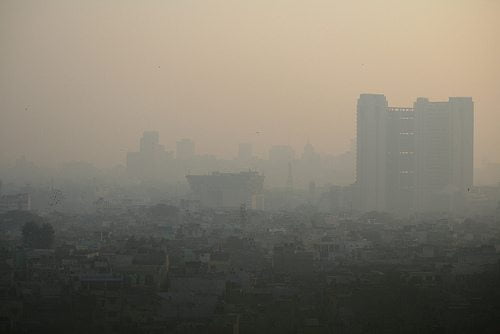

Environment
Greenhouse gas 7,100 times more powerful than CO2 discovered
Perfluorotributylamine (PFTBA), a greenhouse gas 7,100 times more powerful than carbon dioxide in trapping heat, has been indicated as new major player in global warming by scientists in Canada.
PFTBA is an artificial chemical byproduct of the electrical industry, which has been used since the mid-20th century. It had not been investigated as a long-lived greenhouse gas, but scientists found that it can stay in the atmosphere for up to 500 years before dissolving.
According to the study by researchers in Toronto, PFTBA is 7,100 times more powerful at trapping heat and warming the planet compared to carbon dioxide (CO2) over a 100-year period.
“We claim that PFTBA has the highest radiative efficiency of any molecule detected in the atmosphere to date”, said Angela Hong, one of the authors of the study.
However, levels of PFTBA in the atmosphere are low – 0.18 parts per trillion in Toronto, compared to 400 parts per million for CO2 – meaning that the latter remains of greater concern.
“From a climate change perspective, individually, PFTBA’s atmospheric concentration does not significantly alert the phenomenon of climate change. Still the biggest culprit is CO2 from fossil fuel emissions”, Hong said.
However, she warned that the lack of ‘natural absorbers’ – such as forests in case of CO2 – its long life and the lack of policies and regulation over emission of the chemical, might mean that PFTBA could become a bigger problem in the future.
“It is so much less than carbon dioxide, but the important thing is on a per molecule basis, it is very very effective in interacting with heat from the Earth”, Hong added.
“Individually each molecule is able to affect the climate potentially and because its lifetime is so long it also has a long-lasting effect.”
Further reading:
Delaying emission cuts could cause widespread damage
Greenhouse gas at record high – 141% increase on pre-industrial levels
Tipping point on carbon emissions just 30 years away, warn scientists
Global carbon dioxide levels hit highest levels for three million years
The Guide to Climate Change 2013


 Environment12 months ago
Environment12 months agoAre Polymer Banknotes: an Eco-Friendly Trend or a Groundswell?

 Features11 months ago
Features11 months agoEco-Friendly Cryptocurrencies: Sustainable Investment Choices

 Features12 months ago
Features12 months agoEco-Friendly Crypto Traders Must Find the Right Exchange

 Energy11 months ago
Energy11 months agoThe Growing Role of Solar Panels in Ireland’s Energy Future





























